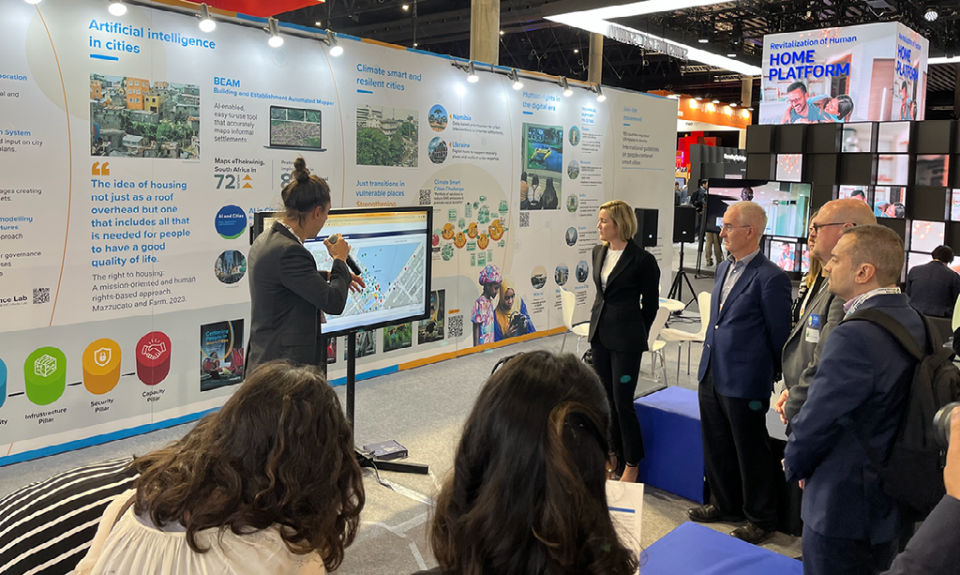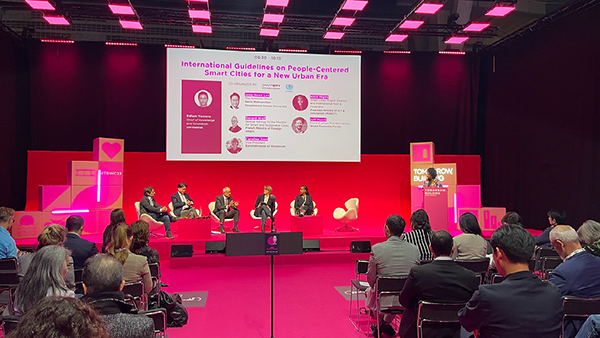
UNITAC demonstrates digital tools and data platforms for participatory urban planning in Barcelona, Spain – Nov 2023
There are many opportunities for the potential of digital technologies to reshape urban living, leading to a better quality of life in cities. However, there are also risks, challenges, and unintended consequences. Consequently there is a growing consensus that the vision of the smart city needs to be updated.
Countries, cities, communities – and the private sector – are advocating for a more human-centric vision for the smart city, shifting from supply-driven strategies to a more needs-driven approach. Smart cities can have a tremendous positive impact on people’s lives, but this is only possible when people are included in and at the centre of the development process.
In November 2023, UNITAC participated in the Smart City Expo World Congress, in Barcelona, Spain, to showcase the initiatives and digital tools developed to accelerate people-centered smart cities. This included hosting panels on digital tools and data for participatory urban planning, and presenting these tools at the UN-Habitat pavilion, in the exhibition area.
UNITAC activities included the panels ‘Innovative uses of data for urban planning’, ‘Centering people in smart cities’, and ‘AI in cities: Governance and capacity needs to achieve the SDGs’.
The panel ‘Innovative uses of data for urban planning’, chaired by Livia Schaeffer Nonose, Technology and Specialist at UNITAC, focused on key elements for a people-centered approach in urban data governance. This included starting from real problems identified by the communities, engaging citizens in data governance, and how governments can shape and act for the public good.
Participation and inclusion for better cities for all, and how digital platforms and technology influences participation, especially of the minorities, was the central discussion in the panel ‘Centering people in smart cities’. This panel was moderated by Pontus Westerberg, UNITAC’s Programme Management Officer and Lead of the Flagship Programme People-Centered Smart Cities.
UNITAC’s Academic Lead, Prof. Dr. Gesa Ziemer, chaired the high-level roundtable ‘Data as a game changer for decision-making’, which featured examples of initiatives worldwide using data to tackle urban challenges.

The UN-Habitat pavilion hosted several guided tours on the different digital tools and data platforms developed by UNITAC and City Science Lab, for a global audience. This included cities and organizations from Latin America, Asia, Europe, Africa and North America, as well as private sector institutions and the European Commission.
During the Smart City Expo, UN-Habitat convened two important sessions to discuss the resolution for the international guidelines on people-centred smart cities, recently approved at the Habitat Assembly of the United Nations, held in Nairobi, Kenya, in June 2023.
The first panel invited distinguished speakers and the audience to reflect on the importance of establishing international guidelines for developing more inclusive, sustainable and people-centred smart cities, with a human rights-based approach. The second session, an invitation-only meeting, included 25 experts from the private sector, academia, government, and NGO. They shared perspectives on establishing a global framework to address key policy gaps in people-centered smart city development. Both sessions were chaired by Edlam Abera Yemeru, Chief of Knowledge and Innovation at UN-Habitat.


